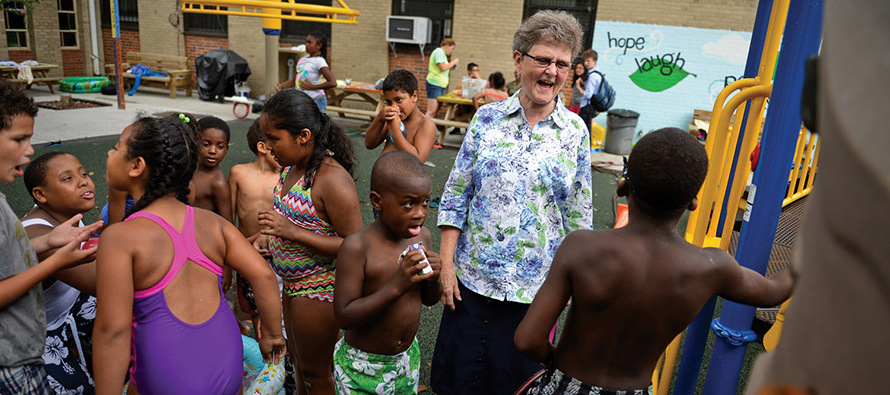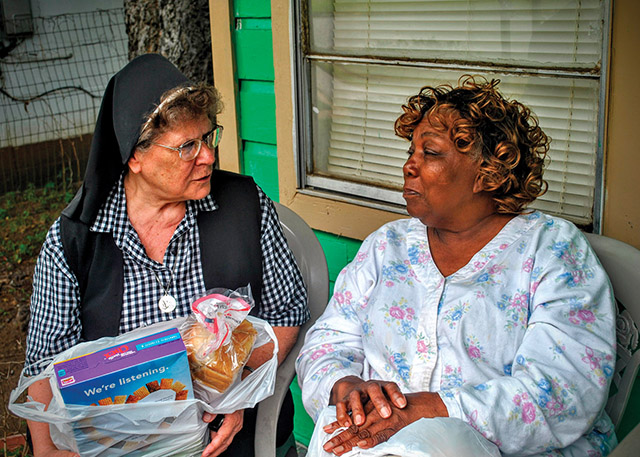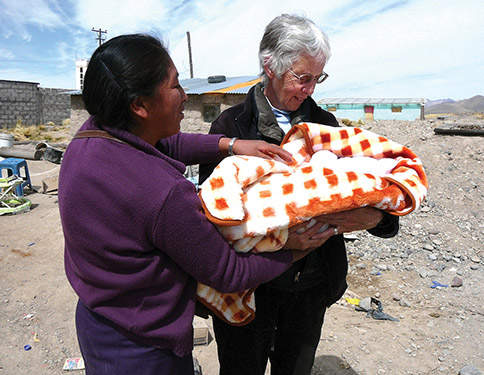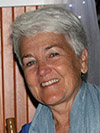See the Spirit in sisters

Sister Tesa Fitzgerald, C.S.J. has worked for years as executive director of Hour Children in Queens, New York, helping thousands of women inmates and their kids get through prison terms and rebuild their lives. (Steve Pfost, courtesy of Opus Prize Foundation)
I was once invited to a festive dinner sponsored by a community organization near the inner-city St. Louis neighborhood where I lived. I was both eager and a little apprehensive as I drove down the dark, unfamiliar streets straining to find the Fifth Baptist Church where the event was to be held.
After close to 30 years of being a nun, almost all of them spent living and working in poor neighborhoods, I tell myself that I am fairly streetwise. But if I am honest, I know that what has kept me safe and allowed me to work joyfully and effectively in dangerous surroundings has less to do with wisdom than with an utterly unearned kind of grace that seems to hover when I’m where I ought to be, doing what I need to do. And I also know from the writings and examples of others who have described this same phenomenon that sometimes the path requires paying the same price as the people among whom we serve. So it was with some relief that I parked safely and found myself at a table with friendly faces.
During dinner the conversation turned, as it always does, to curious questions about nuns. I used to dread the obvious ones (“How can you possibly live without sex!” and “How can you stand just living with women all the time?”). But as I have grown older the questions addressed to me have become more thoughtful. This time the 50-something African American woman sitting next to me wanted to know, “What is it with you nuns? You all seem to have this incredible energy and belief that any good thing is possible.”
I think I told her that it was because we are less likely to get discouraged by the kinds of deeply painful and personal betrayals that can only be caused by a spouse or child, the kind that cause people to lose their sense of direction in life and to doubt that the future is going to bring any healing. I say “less likely” because I know of nuns who have suffered at the hands of church authorities or been hurt by members of their own communities. And there are members of religious congregations who struggle with fears and depressions often rooted in experiences they had as children.
A sign of hope
As I reflected later, I didn’t think my answer told the whole story. While not all nuns are incredibly positive people, the ones in the worst material circumstances or doing the most difficult work with the least attractive populations, do tend to radiate a kind of energy that inevitably attracts notice.
That same energy is present when we serve in more affluent surroundings, but it’s less obvious because there is already a lot that is positive in those environments. I’ve also recognized this same energy at work in men and women of many other faiths, but I think there is something about the communal effort to serve the needs of God’s people while living simply and without a mate that makes religious life a sign of hope, even to people who are not Catholic.
I think of a conversation I had one night while passing out flyers for a meeting in the neighborhood. “Sam” belonged to a family with a reputation for drug dealing, and I assumed that my efforts to increase police surveillance on the block had aroused some resentment. Still, when I saw Sam out in his yard, I decided to give him a flyer and see if he would consider coming to the meeting. At first he was hostile, full of bitter accusations about local politicians, angry about the trash and abandoned buildings, but as we talked back and forth I could feel something melting in his attitude.
“I really need your help, Sam. When you see me out here picking up trash with the children, come join me. Your anger could be a powerful tool if it were harnessed and used for positive change.”
His face changed, and he said, “Don’t get me wrong. I see what you’re doing, and it’s good for the neighborhood and good for the kids. I don’t really even know your name, but we all call you ‘Miss Nun.’ That’s why you can be out here walking through the alleys and no one will lay a hand on you.” I felt the presence of that gratuitous cloud of grace and knew that he was speaking the truth. I had heard the same thing from other men in my old neighborhood in Washington, D.C.

Repeatable patterns
So, what is it with us sisters? How does that positive energy that people notice get generated? Are there patterns that can be recognized and replicated? My own experience of having served in five very different American cities and one foreign country tells me that a few things tend to happen when the Spirit is at work in me or one of my sisters.
First, there is usually a strong desire to go and serve, born out of a sense that we could make a positive difference in a painful situation. Like lymph, we need to flow to the place where the hurt is greatest and just be there as a buffering presence. I think of our sisters in Haiti, who over the past 15 years have weathered political coups, two major hurricanes, an earthquake that destroyed their house, and a cholera epidemic, all without a single thought of abandoning the people with whom they live and work.
A second common insight is that our presence is not going to change things overnight. We go for the long haul, prepared even to see no noticeable change in our own lifetime. Healing may take generations. In more favorable circumstances there is the hope of seeing small changes almost immediately. My presence in North St. Louis brought about such change through the faithful repetition of small “gentling” acts.
It becomes a subversive act to ride a bike and smile at people along the route, despite the conventional wisdom about avoiding eye contact. Learning the names of every neighbor within an eight-block radius and finding out what talents they have breaks down the fortress mentality that often pervades an inner-city neighborhood. As relationships are restored, the physical healing of the neighborhood can begin. This is particularly true when politics or religion have divided a community. Groups like Transition Movement have discovered that neighbors who get to know each other through things like gardening or the arts later have the resilience they need when disaster strikes.

A third insight has to do with the use of power. When I first came to St. Louis, I was reluctant to use the title “Sister” in my work, since I worked for a secular nonprofit. I told myself that it wasn’t necessary for everyone to know that I was a nun, that it might actually be counter-productive. I also worried about my community-organizing efforts turning me into an unofficial mayor of my neighborhood and causing resentment.
I learned, however, that power in itself is neither positive nor negative. It tends to pool wherever an individual or group has made a significant impact, for better or for worse. If I truly wanted to make a positive difference, I had to accept the fact that I would have to end up gathering and using power. The drug dealers and real estate speculators had no qualms about their impact on the neighborhood, and neither should those who wish to be a healing presence. What I heard from the neighbors—in addition to some gentle ribbing about being a “little general”—was genuine gratitude that I was willing to take on a leadership role. In their eyes the title of “Sister” was an asset for our neighborhood, a tool I should use on behalf of the people I served whenever it seemed appropriate.
Disarming adventure
A while ago, I had one of those inner-city adventures that seemed to perfectly illustrate the odd, unpredictable way that love can disarm negative intent. As I was bending over my truck one sunny afternoon to unload groceries, I heard footsteps running up behind me. I assumed it was one of the neighborhood kids coming to give me a hug, as they often do. So when a young man came up close and said, “Give me your purse; I have a gun,” I made the positive (although incorrect) assumption that it was one of my teenagers playing with me. I turned with a big grin and said, “I don’t think so, honey . . . ”
I don’t know who was more surprised when we looked at each other face to face! My affectionate response so confused him that he forgot trying to get my purse and decided to try for keys to my truck by shoving his hands into my coat pockets, where luckily the keys happened to be. While he was trying to get the truck door open I was heading for my house (with my purse!). As I opened the door to my house I heard him shout, “Keep your @#%@# truck. It’s a stick!” and he threw my keys back to me over the fence!
As I reflected on this experience, I realized once again that I had been protected not by my own “street smarts” but by that hovering cloud of positive energy. Do only sisters have access to that kind of grace? Absolutely not. But I do believe that when a religious commitment is lived communally at the service of a population in great need, it can be a powerful tool for good.
A version of this article originally appeared in VISION 2003.
Related article: VocationNetwork.org, “12 steps to sisterhood (if you’re thinking too hard!)”
Tags
Related
- A vocation found on the low road: Profile of Sister Thanh Pham, S.S.M.O.
- Missioned to make connections
- Need-to-knows about becoming a nun
- An art teacher is drawn to something greater: Profile of Sister Lisa Perkowski, I.H.M.
- What a flock of sheep taught its shepherdess
- Sister Vilma’s fearless faith
- Seeing God in a child’s smile: Profile of Sister Marie Elizabeth Jerry, S.S.F.
- Bringing sacred healing to hurting communities
- Sisters help Uvalde move from trauma to trust
- Camaraderie at its best: Profile of Sister Kristine Fernandes, C.S.J. Read More
Most Viewed
- Find your spirituality type quiz
- Questions and answers about religious vocations
- Celibacy quiz: Could I be a nun? Could I be a brother? Could I be a priest?
- Resources for older discerners or those with physical and developmental differences
- About Vocation Network and VISION Guide


